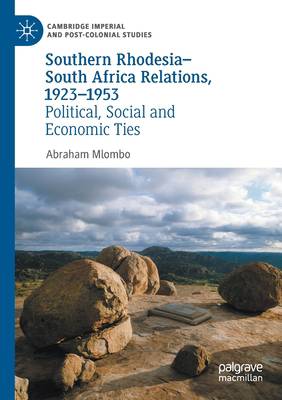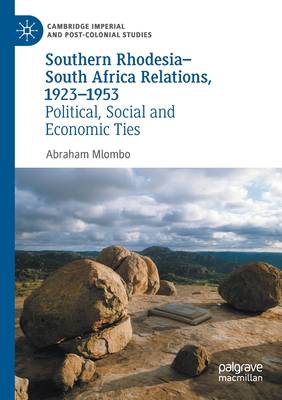
Door een staking bij bpost kan je online bestelling op dit moment iets langer onderweg zijn dan voorzien. Dringend iets nodig? Onze winkels ontvangen jou met open armen!
- Afhalen na 1 uur in een winkel met voorraad
- Gratis thuislevering in België vanaf € 30
- Ruim aanbod met 7 miljoen producten
Door een staking bij bpost kan je online bestelling op dit moment iets langer onderweg zijn dan voorzien. Dringend iets nodig? Onze winkels ontvangen jou met open armen!
- Afhalen na 1 uur in een winkel met voorraad
- Gratis thuislevering in België vanaf € 30
- Ruim aanbod met 7 miljoen producten
Zoeken
Southern Rhodesia-South Africa Relations, 1923-1953
Political, Social and Economic Ties
Abraham Mlombo
€ 52,95
+ 105 punten
Uitvoering
Omschrijving
This book provides the first comprehensive study of the 'special relationship' between Southern Rhodesia and South Africa. While most studies approach this from the history of British and South African relations or the history of South African territorial expansion, this book offers new insights by examining Southern Rhodesia's relations with South Africa from the former's perspective. Exploring relations through the lens of settler colonialism, the book argues that settler colonialism in the region was marked by a competitive and antagonistic relationship between settler communities, particularly Afrikaner and English communities. The book explores the connections between these countries by examining (high) politics, economic links, and social and cultural ties, highlighting both instances of competition and cooperation. Above all, it argues that economic ties were the cornerstone of the relationship and that these shaped the rest of the ties between the two countries. Drawing on archival records from Britain, South Africa and Zimbabwe, as well as a number of secondary sources, it offers a much more nuanced perspective of this relationship than has been previously offered.
Specificaties
Betrokkenen
- Auteur(s):
- Uitgeverij:
Inhoud
- Aantal bladzijden:
- 216
- Taal:
- Engels
- Reeks:
Eigenschappen
- Productcode (EAN):
- 9783030542856
- Verschijningsdatum:
- 9/09/2021
- Uitvoering:
- Paperback
- Formaat:
- Trade paperback (VS)
- Afmetingen:
- 148 mm x 210 mm
- Gewicht:
- 308 g

Alleen bij Standaard Boekhandel
+ 105 punten op je klantenkaart van Standaard Boekhandel
Beoordelingen
We publiceren alleen reviews die voldoen aan de voorwaarden voor reviews. Bekijk onze voorwaarden voor reviews.











